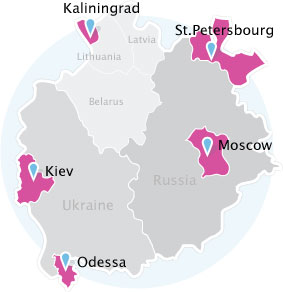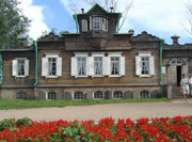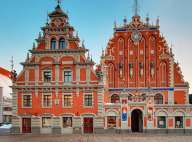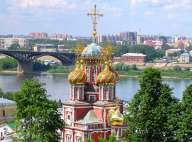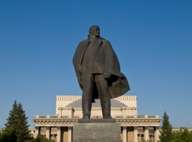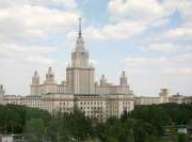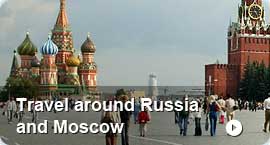Materials Sciences
Higher School of Materials Science
Dean: Professor Yuri D. Tretyakov
International Students Office: phone: +7-095-932-8533, fax: +7-095-939-0998
EMail: root@yudt.chem.msu.su
General Information
The Higher School of Materials Sciences (HSMS) – a new faculty of Moscow University – was opened in 1991 on the initiative of Professor Yu.D.Tretyakov. Its main goal is training specialists mastering both fundamental theoretical principles and practical expertise in the field of Materials Science. The main feature of teaching at HSMS is its interdisciplinary character. During their study our students master the broad field of experimental data of the materials sciences with the stress on the chemical aspects of creation and application of materials. It requires the fundamental training in main chemical disciplines, in the theory of physical phenomena determining the properties of materials, in solid state physics, physics of semiconductors and superconductors, in mathematics. They expertise in carrying out modern chemical and physical experiments; computer skills for search and processing of information, automation of experiments and computations. Recognized specialists in materials sciences from all over the world are regularly invited to deliver lectures for the students of the School.
Since the very first year of studies the students have a unique opportunity to fulfill their own research programme under the supervision of experienced researchers at the laboratories of the Faculties of Chemistry, Physics and Mathematics. The results of their work are presented each term at the Student Scientific conferences.
Bachelour Degree
4 years full time
Chemistry
General Courses
- General Chemistry
- Chemistry of Elements and Bases of Qualitative Analysis
- Materials: Past, Present, Future
- Chemistry of Elements
- Organic Chemistry Chemical Thermodynamics
- Phase Equilibria
- Thermodynamics of Solid State Reactions
- Introduction to Chemical Kinetics
- Crystal Chemistry
Special courses
- Chemistry and Physics of Macromolecular Compounds
- Methods of Analysis of Materials and Substances
- Bases of X-ray Diffraction
- Solid State Spectroscopy
- Chemical Physics of Solid State
- Chemistry of Disperse Systems
- Electrochemistry
- Methods of Local Analysis and Analysis of Surfaces
- Physical Chemistry and Technology of Materials
- Chemistry of Functional Materials
Physics
General Courses
- Dynamic and Statistical Mechanics and Thermodynamics
- Electromagnetism
- Quantum Mechanics
- Statistical Physics
- Introduction to Solid State Physics
Special courses
- Physics of Semiconductors
- Physics of Superconductors
- Physics of Narrow Gap Semiconductors
- Physics of Magnetic Materials and Insulators
- Physics of Non-ordered Media
- Two-dimensional Structures and Supercells
- Experimental Methods of Solid State Physics
Mathematics and Mechanics
General Courses
- Mathematical Analysis
- Analytical Geometry and Linear Algebra
- Computer Programming
- Common and Differential Equations
- Theory of Probabilities and Statistics
- Theory of Function of Complex Variable
Special courses
- Equations of Mathematical Physics
- Tensor Analysis
- Classic Mechanics
- Comtinuum Mechanics
- Methods of Computation
- Theory of Defining Equations
- Structural Mechanics and Fracture Mechanics
Humanities
- History of Civilization
- History of Culture
- History of Russia
- History of Russian Culture
- Economics
- Management
- History of Philosophy
- Philosophy
- Heuristics
- English Language
- French Language
Master Degree
2 years full time
Programmes
- Chemistry
- Physics
- Mechanics of Materials
The main emphasis at this level is made on special practical laboratory courses, special lecture courses delivered on request and research practice at one of the leading institutions of Russian Academy of Sciences in a chosen field. The programme is completed by presentation of the Master Thesis.
Courses
- Chemistry of Functional Materials
- Kinetics and Mechanisms of Solid State Reactions
- Structural Mechanics of Polymers
- Physical and Chemical Methods of Experimental Study of Substances and Materials
- Physical Organic Chemistry
- Chemistry and Technology of Hydro-Thermal Systems
- Crystal Growth and Thin Film Deposition
- Non-crystal State
- Introduction to Non-linear Dynamics
- Methods of Chemistry Teaching
- Inorganic Synthesis
- Modern Inorganic Chemistry
- Design of Inorganic Compounds in Modern Materials Science
- Physical and Chemical Bases of Inorganic Synthesis of Compounds and Materials
- Synthesis of Compounds and Materials in Extreme Conditions
- Paradoxes and Laws of the Phase Transformations of Inorganic Compounds
- Cryoelectronics
- Physical Bases of Microelectronics
- Theory of Viscous Elasticity
- Physics of Composite Materials
- Physics of Polyelectrolite Solutions
- Theory of Covers
- Mechanics of Composite Materials
- Mechanics of Anisotropic Media
- Biomechanics
- Physical and Chemical Mechanics of Fracture
- Dynamics and Vibration of Deformed Media
- Dynamic Systems
PhD Degree
3 years full time
Specialities
- Chemical Material Science
- Solid State Physics
- Low Temperature Physics
- Mechanics of Composite Materials
Students are welcome to the postgraduate studies having a wide choice of themes for their Doctoral projects, connected with the synthesis, diagnostics, physical characterization, theoretical description and modeling of new materials. These projects can be completed at the Faculties of Chemistry, Physics and Mathematics of Moscow State University or at the Institutes of Russian Academy of Science.

